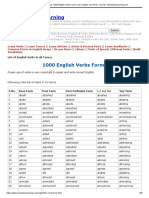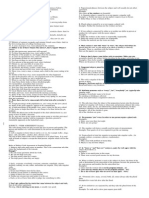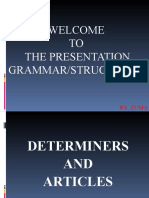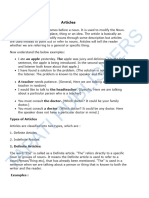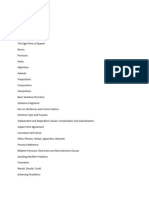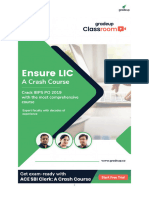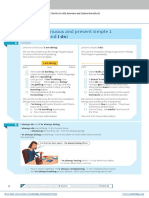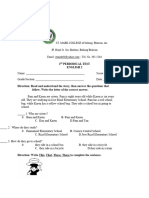0 ratings0% found this document useful (0 votes)
22 viewsArticles: by Guillermo A Rojas Gordillo
This document discusses the usage of articles (a/an and the) in English. It explains that articles are adjectives that modify nouns and that English has two articles: the definite article "the" and the indefinite article "a/an". It provides several grammar rules for using articles correctly, such as how countable vs. uncountable nouns are used. It also lists many specific cases where articles are used or omitted, such as with geographical areas, institutions, illnesses, jobs and more.
Uploaded by
psygargCopyright
© Attribution Non-Commercial (BY-NC)
Available Formats
Download as PPTX, PDF, TXT or read online on Scribd
0 ratings0% found this document useful (0 votes)
22 viewsArticles: by Guillermo A Rojas Gordillo
This document discusses the usage of articles (a/an and the) in English. It explains that articles are adjectives that modify nouns and that English has two articles: the definite article "the" and the indefinite article "a/an". It provides several grammar rules for using articles correctly, such as how countable vs. uncountable nouns are used. It also lists many specific cases where articles are used or omitted, such as with geographical areas, institutions, illnesses, jobs and more.
Uploaded by
psygargCopyright
© Attribution Non-Commercial (BY-NC)
Available Formats
Download as PPTX, PDF, TXT or read online on Scribd
You are on page 1/ 14
ARTICLES
By Guillermo A Rojas Gordillo
Objective
•To be aware of the usage and
problems with articles
What is an article?
•Basically, an article is an adjective.
Like adjectives, articles modify
nouns.
English has two articles
• The
• It is used to refer to specific or particular nouns
• We call the the definite article
• a/an
• It is used to modify non-specific or non-particular nouns.
• a/an is the indefinite article.
Definite Article
• The definite article is used before singular and plural nouns when
the noun is specific or particular.
• The signals that the noun is definite, that it refers to a particular
member of a group.
Examples
• The dog that bit me ran away.
• I was happy to see the policeman who saved my cat!
• I saw the elephant at the zoo.
Grammar rule 1
• When you have a single, countable English noun, you must always
have an article before it.
• We cannot say "please pass me pen", we must say "please pass me the
pen" or "please pass me a pen" or "please pass me your pen".
• Nouns in English can also be uncountable. Uncountable nouns can
be concepts, such as 'life', 'happiness' and so on, or materials and
substances, such as 'coffee', or 'wood'.
Grammar rule 2
• Uncountable nouns don't use 'a' or 'an'. This is because you can't
count them. For example, advice is an uncountable noun. You can't
say "he gave me an advice", but you can say "he gave me some
advice", or "he gave me a piece of advice".
• Some nouns can be both countable and uncountable. For example,
we say "coffee" meaning the product, but we say "a coffee" when
asking for one cup of coffee.
Grammar rule 3
• You can use 'the' to make general things specific. You can use 'the'
with any type of noun – plural or singular, countable or
uncountable.
• "Please pass me a pen" – any pen.
"Please pass me the pen" – the one that we can both see.
• "Children grow up quickly" – children in general.
"The children I know grow up quickly" – not all children, just the
ones I know.
• "Poetry can be beautiful"- poetry in general.
"The poetry of Hopkins is beautiful" – I'm only talking about the
poetry Hopkins wrote.
REFLEXION TIME
More uses of articles in English
• Rivers, mountain ranges, seas, oceans and geographic areas all use 'the'.
For example, "The Thames", "The Alps", "The Atlantic Ocean", "The
Middle East".
• Unique things have 'the'.
For example, "the sun", "the moon".
• Some institutional buildings don't have an article if you visit them for the
reason these buildings exist. But if you go to the building for another
reason, you must use 'the'.
• "Her husband is in prison." (He's a prisoner.)
"She goes to the prison to see him once a month."
• "My son is in school." (He's a student.)
"I'm going to the school to see the head master."
• "She's in hospital at the moment." (She's ill.)
"Her husband goes to the hospital to see her every afternoon."
• Musical instruments use 'the'.
"She plays the piano."
• Sports don't have an article.
"He plays football."
• Illnesses don't have an article.
"He's got appendicitis."
But we say "a cold" and "a headache".
• Jobs use 'a'.
"I'm a teacher."
• Countries
We don't use 'a' if the country is singular. "He lives in England." But if
the country's name has a "plural" meaning, we use 'the'. "The
People's Republic of China", "The Netherlands", "The United States of
America".
• Continents, towns and streets don't have an article.
"Africa", "New York", "Church Street".
• Theatres, cinemas and hotels have 'the'.
"The Odeon", "The Almeira", "The Hilton".
• Abbreviations use 'the'.
"the UN", "the USA", "the IMF".
• We use 'the' before classes of people.
"the rich", "the poor", "the British".
Omission of Articles
• Some common types of nouns that don't take an article are:
• Names of languages and nationalities: Chinese, English, Spanish,
Russian (unless you are referring to the population of the nation:
"The Spanish are known for their warm hospitality.")
• Names of sports: volleyball, hockey, baseball
• Names of academic subjects: mathematics, biology, history,
computer science
You might also like
- English Grammar, 1000 English Verbs Forms, Learn English Verb Forms, Verb List100% (5)English Grammar, 1000 English Verbs Forms, Learn English Verb Forms, Verb List26 pages
- English Articles - A, An, The: Grammar Rule 1No ratings yetEnglish Articles - A, An, The: Grammar Rule 12 pages
- We Usually Use No Article To Talk About Things in General - The Doesn't Mean AllNo ratings yetWe Usually Use No Article To Talk About Things in General - The Doesn't Mean All13 pages
- Welcome TO The Presentation Grammar/Structure 1: By: ZumaNo ratings yetWelcome TO The Presentation Grammar/Structure 1: By: Zuma29 pages
- Прво има еден дел во црвено кој не e потребен само тука е за секој случај ако нешто плус и текне да прашува, иначе само тоа во црно е потребно. ArticlesNo ratings yetПрво има еден дел во црвено кој не e потребен само тука е за секој случај ако нешто плус и текне да прашува, иначе само тоа во црно е потребно. Articles11 pages
- 1_M3_GRAMMAR S1, Complete Course, Pr. ZanzounNo ratings yet1_M3_GRAMMAR S1, Complete Course, Pr. Zanzoun68 pages
- Use of Article: What Is An Article? Basically, An Article Is An Adjective. Like Adjectives, Articles Modify NounsNo ratings yetUse of Article: What Is An Article? Basically, An Article Is An Adjective. Like Adjectives, Articles Modify Nouns8 pages
- MR - Ramy .Z.A.Mohamed: A An The The A AnNo ratings yetMR - Ramy .Z.A.Mohamed: A An The The A An4 pages
- Using English Articles 3 Simple Rules To Fix Common Grammar Mistakes ErrorsNo ratings yetUsing English Articles 3 Simple Rules To Fix Common Grammar Mistakes Errors8 pages
- A, An or The?: The and A/an Are Called "Articles". We Divide Them Into "Definite" and "Indefinite" Like ThisNo ratings yetA, An or The?: The and A/an Are Called "Articles". We Divide Them Into "Definite" and "Indefinite" Like This5 pages
- Folktales (Big Ideas: High Beginner): Wayzgoose Graded ReadersFrom EverandFolktales (Big Ideas: High Beginner): Wayzgoose Graded ReadersNo ratings yet
- Module - 2 - Past Progressive-Simple Past ModificadoNo ratings yetModule - 2 - Past Progressive-Simple Past Modificado8 pages
- IELTS Writing and Speaking Skills - Facebook Com LinguaLIBNo ratings yetIELTS Writing and Speaking Skills - Facebook Com LinguaLIB210 pages
- LCS 212 Assignment 2 2024 FINAL MEMO.docxNo ratings yetLCS 212 Assignment 2 2024 FINAL MEMO.docx5 pages
- Functional English Unit 01 Notes Prepared by Saira QasimNo ratings yetFunctional English Unit 01 Notes Prepared by Saira Qasim11 pages
- As Far As Till / Until Up To As Far As Up To As Far As Till / Until Up To Till / Until As Far AsNo ratings yetAs Far As Till / Until Up To As Far As Up To As Far As Till / Until Up To Till / Until As Far As29 pages
- Alvin and The Chipmunks - Present PerfectNo ratings yetAlvin and The Chipmunks - Present Perfect2 pages
- Cambridge Lower Secondary Progression Test: English Mark Scheme100% (2)Cambridge Lower Secondary Progression Test: English Mark Scheme22 pages
- ĐỀ CƯƠNG ÔN TẬP TIẾNG ANH 1 (Lớp TA 1-Life)No ratings yetĐỀ CƯƠNG ÔN TẬP TIẾNG ANH 1 (Lớp TA 1-Life)6 pages
- English Grammar, 1000 English Verbs Forms, Learn English Verb Forms, Verb ListEnglish Grammar, 1000 English Verbs Forms, Learn English Verb Forms, Verb List
- We Usually Use No Article To Talk About Things in General - The Doesn't Mean AllWe Usually Use No Article To Talk About Things in General - The Doesn't Mean All
- Welcome TO The Presentation Grammar/Structure 1: By: ZumaWelcome TO The Presentation Grammar/Structure 1: By: Zuma
- Прво има еден дел во црвено кој не e потребен само тука е за секој случај ако нешто плус и текне да прашува, иначе само тоа во црно е потребно. ArticlesПрво има еден дел во црвено кој не e потребен само тука е за секој случај ако нешто плус и текне да прашува, иначе само тоа во црно е потребно. Articles
- Use of Article: What Is An Article? Basically, An Article Is An Adjective. Like Adjectives, Articles Modify NounsUse of Article: What Is An Article? Basically, An Article Is An Adjective. Like Adjectives, Articles Modify Nouns
- Using English Articles 3 Simple Rules To Fix Common Grammar Mistakes ErrorsUsing English Articles 3 Simple Rules To Fix Common Grammar Mistakes Errors
- A, An or The?: The and A/an Are Called "Articles". We Divide Them Into "Definite" and "Indefinite" Like ThisA, An or The?: The and A/an Are Called "Articles". We Divide Them Into "Definite" and "Indefinite" Like This
- Folktales (Big Ideas: High Beginner): Wayzgoose Graded ReadersFrom EverandFolktales (Big Ideas: High Beginner): Wayzgoose Graded Readers
- Module - 2 - Past Progressive-Simple Past ModificadoModule - 2 - Past Progressive-Simple Past Modificado
- IELTS Writing and Speaking Skills - Facebook Com LinguaLIBIELTS Writing and Speaking Skills - Facebook Com LinguaLIB
- Functional English Unit 01 Notes Prepared by Saira QasimFunctional English Unit 01 Notes Prepared by Saira Qasim
- As Far As Till / Until Up To As Far As Up To As Far As Till / Until Up To Till / Until As Far AsAs Far As Till / Until Up To As Far As Up To As Far As Till / Until Up To Till / Until As Far As
- Cambridge Lower Secondary Progression Test: English Mark SchemeCambridge Lower Secondary Progression Test: English Mark Scheme
